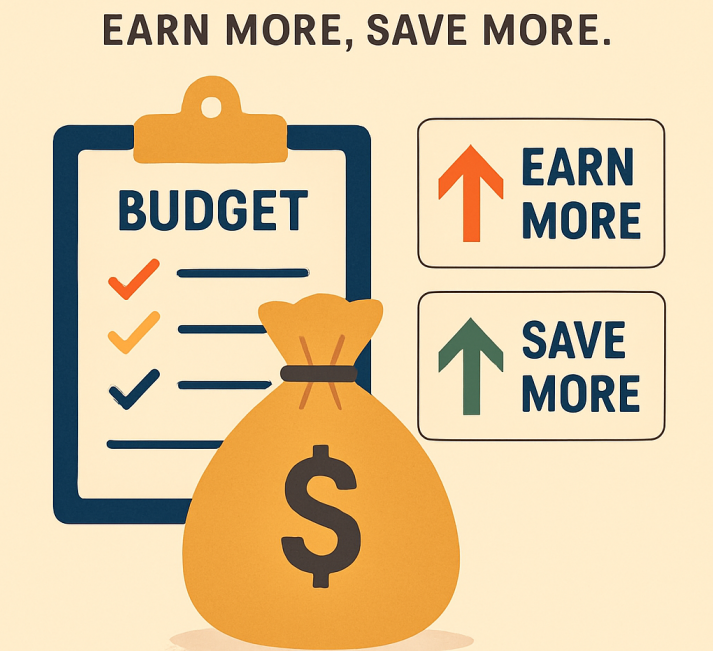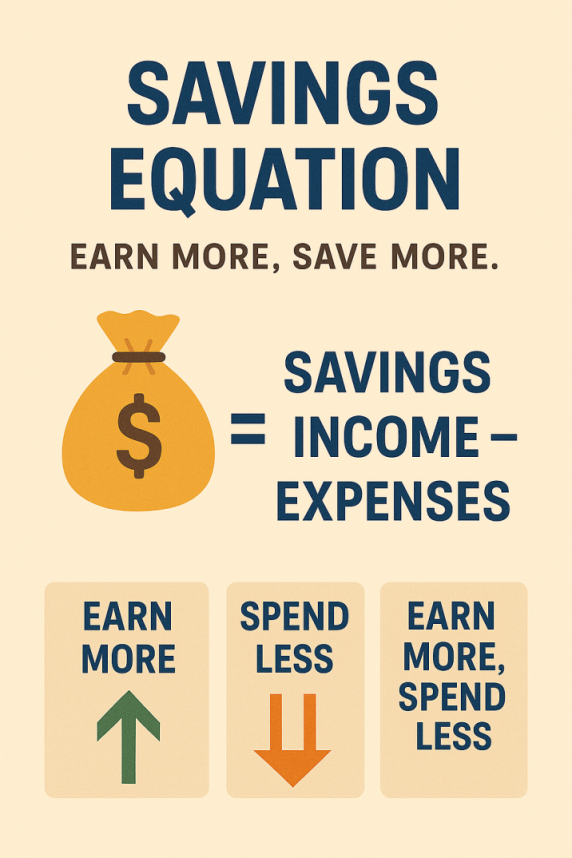Budgeting Basics: How to Build Savings and Grow Income
What is a Budget and Budgeting? How Income, Savings, and Expenditures Are Calculated
Dear SmartyPurse reader, do you know how much you spend each month on average?
Most of us know what our salary was last month, but do you know exactly how much you spent — and on what? Did you manage to save anything, or did everything disappear by the end of the month? Is it possible you even spent more than you earned, adding some credit card debt?
This article guides you through the basics of budgeting, covering what constitutes your income, how to bucket your expenses, understanding net worth, and calculating your savings rate. These are fundamental and relatively simple concepts that can help you take control of your personal finances.

The foundation of every financial goal is a sound budget. Let me share a story about someone who mastered budgeting — my grandmother.
Living on a $220 Monthly Pension: A Lesson in Budgeting and Saving Money
My grandma was born in 1932. She did not have higher education and worked her whole life in a museum. Her pension was tiny. In today’s money, it would be about $220 per month (we’re talking about an EU country, and this is the average pension there in 2024).
My grandma is no longer with us, and I cherish writing this in her memory. She raised my sister and me 30 years ago. Despite her tiny pension, she managed to feed us, pay utilities, and — yes — save money!
She taught me budgeting not by explaining it but by showing it to me every single day.
How Did She Do It?
A disclaimer: My grandma was not an exception. Most older people around us lived similarly — we had plenty to eat, went on holidays, owned our apartment, did not consider ourselves poor, and had a happy childhood.
The purpose of this example is to show you budgeting at its most extreme.
She was frugal.
My grandma saved on absolutely everything: grocery shopping directly from producers and special wholesale markets, hardly ever buying new clothes or household goods. We even made our own soap for washing clothes and bathing.
We owned the apartment.
My grandma had repaid her apartment loan while she was still working, so she didn’t have to pay rent or a mortgage anymore.
She took side jobs.
She cooked for a wealthy friend, sold dried linden flowers and leaves, and picked up other small jobs here and there.
Is There a Secret to Successful Budgeting?
Not really. She just kept her expenses very low and added to her income. As a result, she could save a little every month.
“But there must be a secret?” you may ask.
Yes, there is — the secret lies in her character. Here are the qualities that helped her succeed:
Discipline
My grandma had a clear plan for keeping her expenses low and managing her daily tasks, and she stuck to it without fail.
Social Skills
She was a very social person, doing favors for others and building a strong network. This goodwill often translated into opportunities like free holiday stays or fresh produce from friends.
Hard Work
From very early in the morning, she was always busy. What we now call side hustles, she had already mastered long ago — without the internet!
She could not have achieved financial stability by simply enjoying a quiet retirement. My grandma was constantly in motion, always budgeting and maximizing every opportunity.
This was her way of living on a tight budget — but your path can be different.
What Is a Budget? Your Essential Guide to Personal Finance
Pick a time-frame — usually one month or one year. Simply put:
Income is all the money that comes in.
Expenditures are all the money that goes out.
Savings are what’s left over.
Savings = Income – Expenses
After the month ends, you can check your actual numbers. But if you want to control them before the month begins, you need to plan — and that’s called budgeting.
When people talk about a “budget,” they usually have a goal in mind. Here’s a simple example:
Example: $10,000 Annual Savings Goal
I will earn $70,000 this year, spend $60,000, and save $10,000.
My financial goal: Repay part of my mortgage and increase my home ownership.
So my goal for the next year is to lower my mortgage which is equivalent to saying “to increase my home ownership”. In other words, I am saving more and investing these savings in physical property (my home). If all goes as planned, at the end of the year my net worth will be higher because I will own more real estate compared to the beginning of the year. Savings increase my assets.
I chose this example on purpose. Everybody who has a mortgage is already actively saving and investing because the mortgage is an investment in real estate.
In short:
- Income > Expenses => More Cash (Savings Increase)
- Mortgage Prepayment => Decrease in Cash, Increase in Real Estate Investment
The Savings Equation: How to Budget Smarter
Let’s revisit:
Savings = Income – Expenditures
The formula is the same for everyone.
How we manage our income and spending is what sets us apart.
Everyone wants to be richer, whether it’s to achieve financial freedom or to maintain their current comfort.
So, how can you get richer?
There are only three ways:
- Earn more, spend the same.
- Earn the same, spend less.
- Earn more, spend less.

Which will you choose?
While you think about it, let’s dive deeper into income.
What Is Income? Active vs. Passive Income in Budgeting
To keep things simple and budget-focused, think of income as all cash that goes into your bank account during a period (usually monthly).
It’s hard to predict income far into the future, so most people use monthly or annual budgets. I personally do both.
Based on the effort it requires, income can be split into 2 major categories – active and passive. Active is the one that requires a lot from you (your effort and your time), you will not get it if you do not work for it. Passive is the sweet one that requires little of you, but you still get it (think of inheriting an apartment, renting it out and receiving the rent monthly in your bank account).
Sometimes we need to work actively to reach a stage after which income will flow passively. It is very important to spend some time thinking about passive income because it is a powerful tool to become rich. With active income you are constrained – I can only work one full-time monthly job; the day is just 24 hours; I cannot clone myself even though AI helps a lot these days, there is a limit to my efforts. With passive income, however, there are very few limitations.
Active Income: Requires your time and effort (e.g., salary, commissions).
Passive Income: Flows in with minimal effort (e.g., rental income, dividends).
Working toward building passive income streams is crucial for achieving long-term wealth, since active income is limited by time and energy.
Common Sources of Income
The table below shows some of the most common sources of income. Spend some time on it, think about where your cash streams come from. Do you rely just on one source? Rich people usually have many sources of income, both active and passive.
| Income Source | Effort Level (Active/Passive) |
|---|---|
| Salary | Active |
| Tips and commissions | Active |
| Profits from sales | Active |
| Rental income | Passive |
| Stock dividends | Passive |
| Bond coupons | Passive |
| Royalties | Passive |
| Pension withdrawals | Passive |
| Government benefits/tax refunds | Passive |
Example: Sarah’s Budgeting and Income Strategy
Sarah, 35, works in HR in Italy but owns an apartment in Poland. She writes articles for an HR magazine and invests in high-dividend ETFs.
Her income last month:
| Source | EUR |
|---|---|
| Salary | 2,000 |
| Rent from apartment | 750 |
| Dividends | 50 |
| Freelance commissions | 200 |
| Total | 3,000 |
If Sarah relied solely on her monthly salary, she would have made 2,000 Euro per month, while she makes 50% more. She has made 3 very important decisions:
- to invest in dividend-paying stocks
- to write articles on the side
- to buy a small apartment in her home country where property prices are lower
Notice that Sarah works in HR and she writes articles for an HR magazine. She capitalizes on her skills to earn extra income. Sarah is currently attending an online course in people management. She is developing her soft skills and plans to apply for a more senior job in HR. When she creates her budget for next year, she puts a monthly salary of EUR 2500 as she expects to get a 25% salary increase in her new job.
Sarah is investing in her future income – she is spending time, effort and possibly money now to develop skills which she will capitalize in the medium-term by finding a better job. She is actively planning for this and incorporating it into her budget.
Take-aways:
Sarah earns 50% more than her salary through smart budgeting and multiple income streams.
She also invests in her future income by taking online courses, planning to upgrade her career — a perfect example of budgeting for future gains.
Income-Generating Ideas: Budgeting Your Way to More Money
This topic deserves an article of its own.
Here are quick ideas to boost your budget:
- Invest in the stock market and get cash from dividends/coupons, sell stocks/bonds/ETF shares at a profit
- Switch jobs to increase your salary, you may choose to develop a skill or get a certificate before that
- Sell old books, furniture/clothes you do not need, house plants
- Are you an expert in any field? Write an article as a free-lancer
- Are you passionate about a product or service? Check if you can sell it for a commission. Maybe you are good at taking photos? Using AI to help you generate high-quality content to sell after?
- Think of what you can do that may be valuable to people – from manual to intellectual work, there is no limit
| Idea | Reason |
|---|---|
| Invest in stocks and bonds | Cash from dividends and profits |
| Get a higher-paying job | Quick salary boost |
| Freelance writing | Monetize your skills |
| Sell old/refurbished items | Turn clutter into cash |
| Start a business | Build an independent income |
| Sell products online | Monetize passions |
| Offer services | Utilize skills |
Spending Smarter: Budgeting Your Expenses
If income is what comes in, expenses are what goes out.
There are different ways to look at costs, you will find many articles about cost-bucketing but the easiest and most useful way to group expenses is into: Necessities, Luxuries, and Investments.
There are no strict rules how to group your expenses. I developed an order that first, focuses attention on why we spend at all; second, makes it easy to plan and keep them under control.
Group your expenses into:
Necessities
These are the things we cannot live without in the sense of our modern way of living. There are several categories within and some examples to give you an idea.
Essential to daily living:
| Category | Examples |
|---|---|
| Food | Grocery shopping |
| Rent/mortgage | Housing costs |
| Utilities | Internet, electricity |
| Transportation | Gas, public transit |
| Healthcare | Medicine, check-ups |
| Clothing | Seasonal essentials |
| Basic personal care | Shampoo, toothpaste |
Luxuries
These are things we can live without or things for which there is an available alternative in the “Necessities” bucket. Please do not read luxuries as something bad or wasteful. Some of the items below might be considered close to a necessity. Having certain luxuries in your budget might be one of your financial well-being goals.
The problem with luxuries is that they have no limit. There is always a faster, flashier car; a bigger, more expensive house; designer clothes and accessories with wild price ranges; all kinds of restaurants, not to mention you can eat out every night. You get my point.
We live in a consumer-driven society. We are constantly being manipulated to spend more. If we do not keep our spending on luxuries under control, we will not be able to reach our financial goals irrespective of how much we earn. Necessities we cannot choose – they are what they are, we have basic needs to cover, but luxuries-spending is completely within our control. We have to pay attention, so we choose what we want and we choose it intentionally.
Desirable but optional:
| Category | Examples |
|---|---|
| Food and drinks | Restaurants, exotic groceries |
| Transportation | Expensive car leases |
| Healthcare | Premium services |
| Clothing and cosmetics | Designer brands |
| Digital perks | Subscriptions |
| Private education | Alternative options available |
Luxuries are unlimited — if left unchecked, they can sabotage your budgeting goals.
Investments
These are regular or one-off expenses that have future income-generating benefits. I put them under spending because they come out of your monthly income. Another reason is that each expenditure we make, should be done for a reason:
- to cover a basic need like eating a balanced meal (necessity),
- to bring us joy and happiness like going to a concert (luxury)
- to develop our career prospects like attending a presentation-skills workshop (investment)
Most people associate investments with buying stocks and real estate but they are much more broadly defined as anything that has the potential to increase your future wealth. You will notice in my list below as investments skills-developing and educational expenses.
For example, I attend a three-month paid coding camp with the intention to change my job and move to IT where salaries are higher than in my current one. The class tuition is an expense but also an investment. Yes, I am not guaranteed a better job in 3 months but are you guaranteed a set return when you invest on the stock market – usually not.
Here is a list with some examples:
- Buying stocks, bonds, ETF shares
- Investing in mutual funds or supplementary pension funds
- Purchasing physical real estate
- Attending skills-developing or educational courses
- Attaining education degrees and certificates
- Books, podcasts, workshops, conferences aimed at personal and/or professional development
Spending today for future gains:
| Investment Type | Examples |
|---|---|
| Financial | Stocks, bonds, real estate |
| Education | Skills courses, certifications |
| Personal growth | Books, workshops, conferences |
Beyond Money: Budgeting for Life Goals
Budgeting isn’t just about money — it’s about building the life you want.
For example, one of my current goals is to feel self-fulfilled and happy.
I use my budget to plan investments in books, courses, and experiences that enhance my confidence and personal growth.
What non-material goals would make you happier?
Use your budget to achieve them!
Final Thoughts on Budgeting, Saving, and Building Wealth
Budgeting is not about restriction — it’s about intention.
It’s your tool to create the financial stability and life you desire.
The more intentional you are about your budget, the more freedom you will ultimately gain.
If you need motivation to start your saving and investing journey, check my article: https://smartypurse.com/5-powerful-reasons-to-start-saving-and-investing-now/

